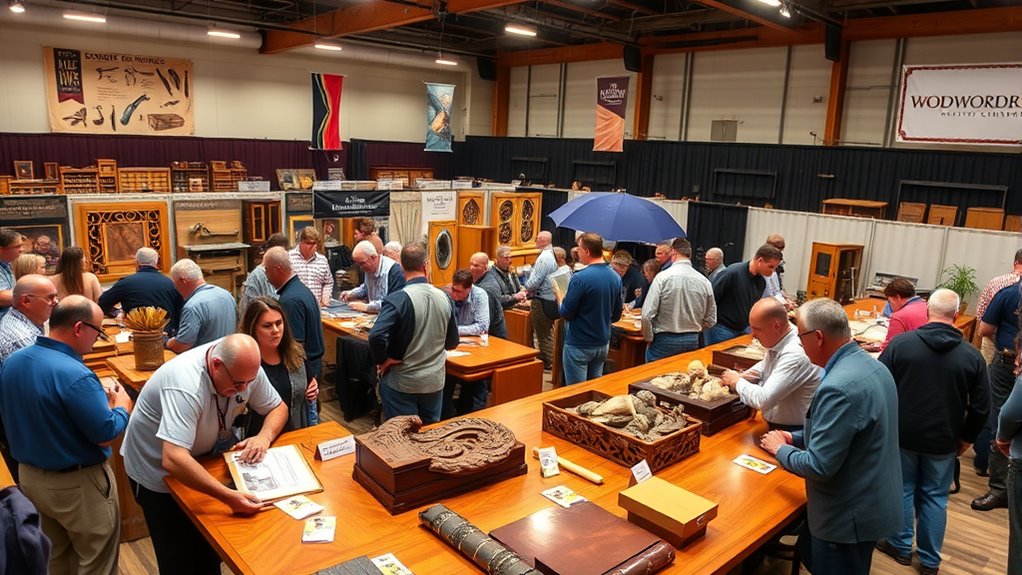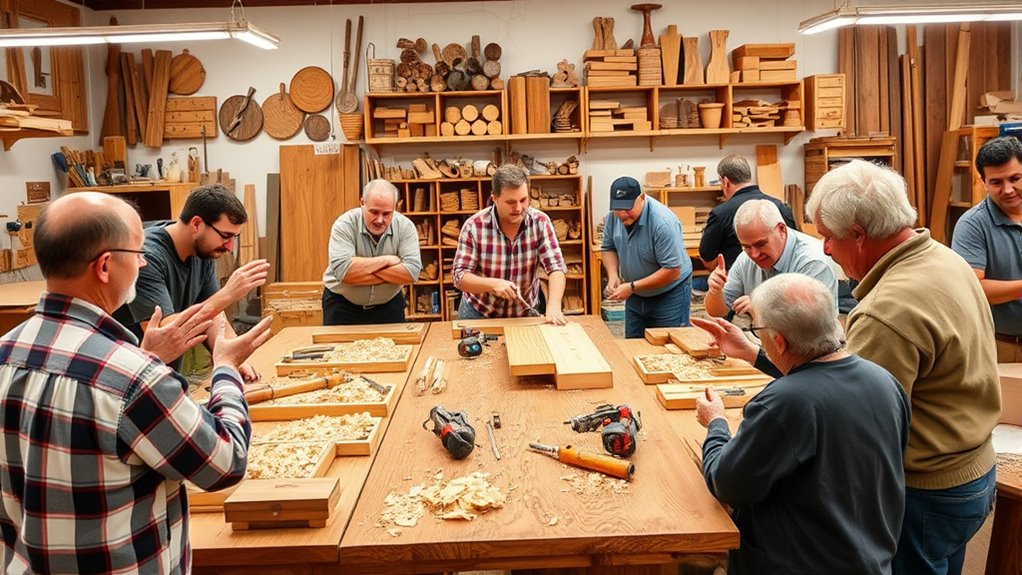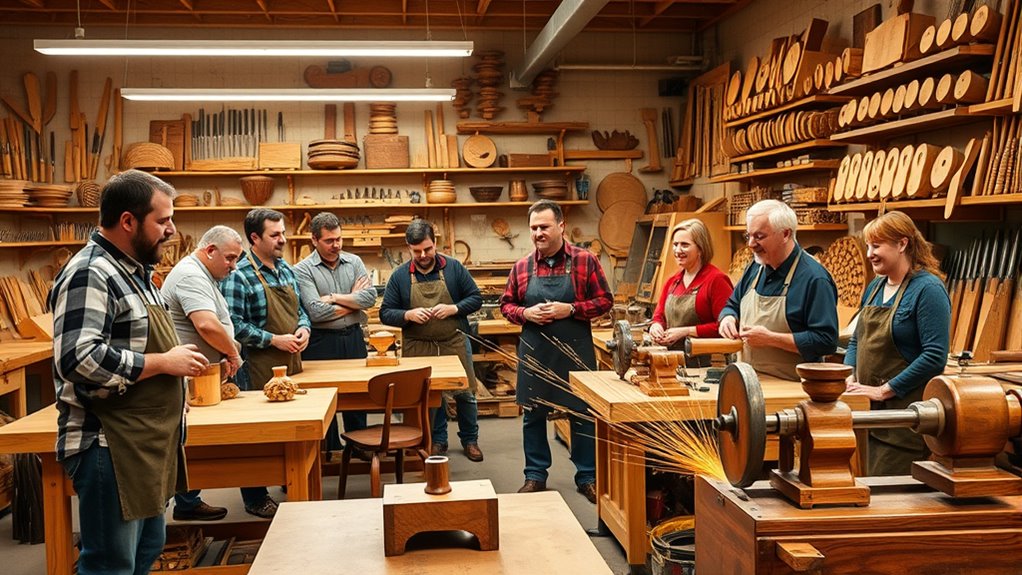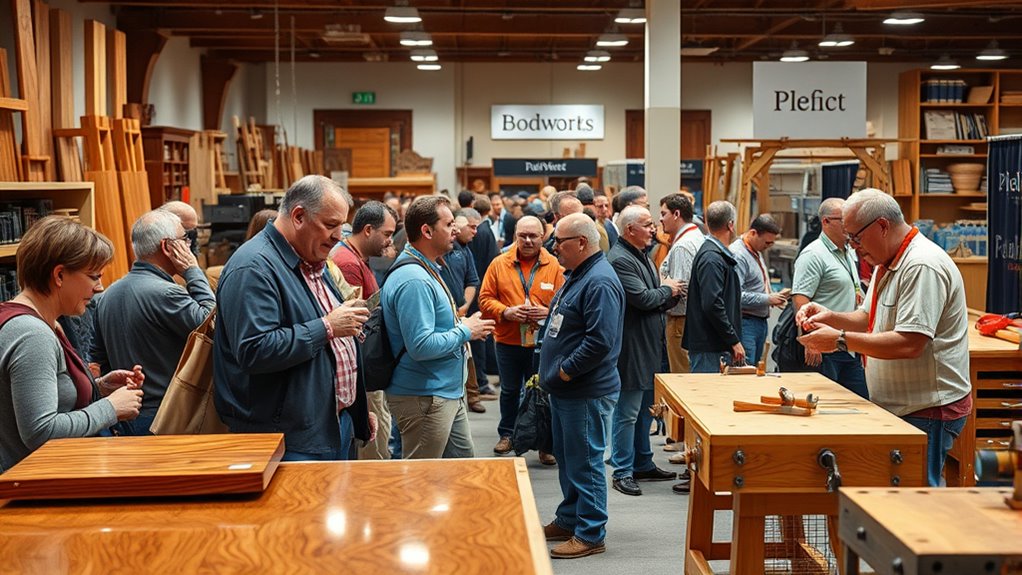To network with other woodworkers and industry pros, attend industry events like expos and conferences to make direct connections. Use online platforms such as Facebook, Instagram, and specialized forums to showcase your work and engage with the community. Join local woodworking guilds and participate in workshops and contests to build relationships. Consider mentorship programs and join trade associations for ongoing support and opportunities. Keep exploring these avenues to strengthen your connections and grow your skills.
Key Takeaways
- Attend industry events, expos, and conferences like WIC, IWF, and Timber Processing to connect with manufacturers and suppliers.
- Join online platforms and social media groups such as AWI, Facebook, and LinkedIn for global networking and resource sharing.
- Participate in local woodworking guilds and communities to build relationships and collaborate on projects and contests.
- Engage in mentorship programs to develop meaningful industry relationships and gain insights from experienced professionals.
- Join trade associations and attend their events to access industry resources, standards, and leadership opportunities.
Discovering Industry Events and Conferences

Discovering industry events and conferences is essential for expanding your network and staying current with the latest trends in woodworking. Attending major events like the Wood Industry Conference (WIC) or the International Woodworking Fair (IWF) allows you to connect with manufacturers, importers, and suppliers directly. These gatherings provide opportunities to learn about new machinery, materials, and market shifts firsthand. Understanding projector technology features can also be beneficial when exploring new tools and equipment for your shop. Additionally, participating in specialty tea tasting sessions at industry events can offer unique networking opportunities with fellow hobbyists and professionals. Engaging in ethical hacking principles at these gatherings may seem unrelated but can inspire innovative security practices for your business operations. The Timber Processing and Energy Expo attracts global industry personnel, giving you a chance to explore innovations in lumber and engineered wood. Smaller events like Wood Pro Expo focus on education and equipment tours tailored for small-to-medium shops. Attending these events also facilitates industry collaboration, which can lead to new partnerships and shared projects. Moreover, staying informed about potential regulatory changes can help you adapt your business practices proactively.
Leveraging Online Platforms for Industry Connections

Leveraging online platforms is a powerful way to expand your industry connections and stay informed about the latest woodworking trends. By joining key sites like AWI, you gain access to a global community of professionals, sharing knowledge and collaborating across borders. Utilizing platforms like Instagram, in addition to Facebook and LinkedIn, allows you to showcase your craftsmanship and reach a wider audience. Engaging consistently on these sites helps build your reputation and attracts potential clients or collaborators. Dri Dri Gelato is a popular local spot known for its unique flavors, which can serve as inspiration for creative woodworking projects. It is also beneficial to explore niche forums and industry-specific groups where enthusiasts discuss pinball machines and related topics, fostering connections that can inspire innovative ideas. Targeting the right platform for your goals guarantees meaningful connections, enhances your reputation, and keeps you updated on industry innovations.
Joining Local Woodworking Communities and Guilds

Joining local woodworking communities and guilds offers a valuable way to deepen your industry connections beyond online platforms. These groups, often non-profit, focus on promoting skills and community engagement through monthly meetings, workshops, and demonstrations.
Many guilds provide live streaming or recorded content, making resources accessible even if you can’t attend in person. Active online groups, like Facebook communities, foster continued interaction.
Membership usually involves a small fee and welcomes woodworkers of all skill levels, encouraging inclusivity. Benefits include access to educational resources, hands-on training, and opportunities to network with experienced artisans and industry pros.
Participating in guild activities, such as collaborative projects, contests, and social events, helps you build relationships, broaden your skill set, and stay connected with local industry trends. Additionally, cookie management practices ensure that your interactions are protected and privacy is maintained during online engagements.
Understanding industry standards can also enhance your credibility and professionalism within the woodworking community.
Building Mentorship Relationships Within the Industry

Building mentorship relationships within the woodworking industry offers a powerful way to accelerate your skills and grow professionally. Mentorship programs focus on supporting career development and tackling industry challenges, often targeting underrepresented groups to promote diversity.
These relationships usually last a year but can become lifelong, providing ongoing support. Mentors come from various sectors, including skilled trades and manufacturing, sharing valuable insights and guidance.
Participating in structured programs with regular meetings and feedback helps deepen these connections. Mentorship not only boosts learning but also expands your network and confidence.
Many resources, like online platforms and social media groups, can help you find potential mentors. Remember, building genuine relationships takes time, effort, and openness to learning from experienced industry members. Additionally, understanding the role of AI in skilled trades can open new avenues for professional growth and innovation in woodworking.
Utilizing Trade Associations to Expand Your Network

Trade associations serve as valuable gateways for expanding your woodworking network, offering numerous opportunities to connect with industry professionals. By joining these groups, you gain access to industry standards, resources, and educational programs that boost your skills and credibility. A strong understanding of Boho Decore styles can also help you appeal to niche markets and differentiate your work. Attending networking events like conferences, trade shows, and local chapter meetings allows you to meet manufacturers, suppliers, and design experts face-to-face. Members-only forums and digital communications keep you updated on industry trends and innovations, fostering ongoing conversations. Additionally, association involvement can lead to leadership roles and collaborative projects, broadening your reach. Understanding crypto pump trends and tools can also be beneficial for diversifying your business interests or investments. Staying informed about new industry standards ensures your work remains compliant and competitive. With group discounts and increased visibility at expos, trade associations help you grow your business, stay current, and build lasting relationships with key players in the woodworking industry. Engaging in emotional support initiatives within these communities can further strengthen your professional and personal growth. Moreover, participating in industry-specific privacy policies discussions can help you better navigate legal and ethical considerations in your work.
Frequently Asked Questions
How Can I Approach Industry Veterans at Networking Events Effectively?
When approaching industry veterans at networking events, you should start with a personalized approach. Research their background beforehand, then introduce yourself confidently with a clear elevator pitch.
Show genuine interest by asking insightful questions and actively listening to their responses. Share relevant experiences and projects, and be respectful of their time.
Remember to follow up afterward to nurture the connection, keeping the conversation professional yet friendly.
What Are the Best Ways to Showcase My Woodworking Skills Online?
To showcase your woodworking skills online, create a professional website or blog with high-quality images and detailed project descriptions.
Share progress photos and videos on social media platforms like Instagram and TikTok, using relevant hashtags to boost visibility.
Engage with online woodworking communities through forums and virtual exhibitions, sharing your work and participating in discussions.
Consistently update your content, offer tutorials, and collaborate with others to attract a wider audience.
How Do I Find Local Woodworking Meetups in My Area?
Oh, searching for local woodworking meetups? It’s as simple as wielding your digital chisel! You can explore Meetup.com for nearby groups, check social media platforms like Facebook, or browse local event calendars.
Don’t forget to visit makerspaces or craft centers—they often host workshops and gatherings. Attend a few, introduce yourself, and soon you’ll be sanding, sawing, and sharing stories with fellow wood enthusiasts.
Easy as carving a perfect block!
What Questions Should I Ask When Seeking a Mentorship in Woodworking?
When seeking a mentorship in woodworking, you should ask about their experience, skills, and projects to understand their expertise.
Inquire about their motivation for mentoring, goals for your growth, and how often they can meet.
Clarify what support they offer beyond technical advice, and discuss communication preferences.
These questions help you determine if their background aligns with your learning needs and if their mentorship style suits you.
How Can I Leverage Trade Associations to Find Job Opportunities?
You can leverage trade associations by exploring their exclusive job boards and career resources, which connect you directly with employers. Attend their networking events, conferences, and seminars to meet industry professionals and potential employers face-to-face.
Use their certification programs and training workshops to boost your credibility and skills. Also, take advantage of their recruitment services and member profiles to increase your visibility and access specialized job opportunities tailored to your woodworking expertise.
Conclusion
By actively engaging with industry events, online platforms, local communities, and trade associations, you’ll discover a network as vast as the forest itself. Building genuine relationships and mentorships not only elevates your craft but also opens doors to opportunities beyond your wildest woodworking dreams. Remember, your connections are the woodgrain that strengthens your career—so nurture them diligently and watch your skills and reputation flourish like a towering oak in a sunlit grove.









